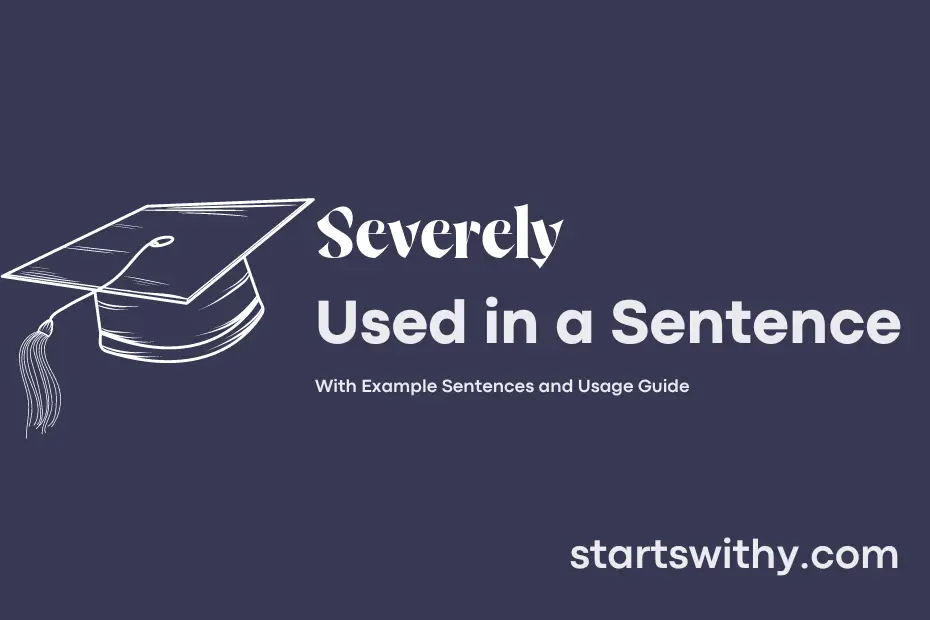Are you looking to learn more about how to use the word “severely” correctly in a sentence? When used to describe something in a strong and extreme manner, “severely” can greatly amplify the intensity of your statement.
This adverb is often employed to emphasize the seriousness or extent of a situation, condition, or action. By using “severely” effectively in your writing or speech, you can provide a clearer and more impactful description of the degree of severity involved.
7 Examples Of Severely Used In a Sentence For Kids
- The storm was severely strong and made everything shake.
- The sunburn was severely painful on her skin.
- The little boy was severely upset when he dropped his ice cream.
- The tree was severely damaged by the big wind.
- The puppy was severely scared of the loud thunder.
- He was severely embarrassed when he tripped and fell in front of everyone.
- The car was severely damaged in the big crash.
14 Sentences with Severely Examples
- Severely procrastinating on your assignments may lead to a last-minute rush and poor quality work.
- Make sure to manage your time effectively to avoid severely cramming for exams.
- Missing classes severely impacts your understanding of the subject matter.
- Severely underestimating the difficulty of a course can lead to poor performance.
- Failing to follow academic integrity can severely damage your reputation and future prospects.
- Severely neglecting self-care can affect your mental and physical well-being.
- Not seeking help when needed can severely hinder your academic progress.
- Severely exceeding your budget can lead to financial stress and difficulties.
- Severely relying on caffeine to stay awake can disrupt your sleep schedule.
- Severely comparing yourself to others can harm your self-esteem and confidence.
- Severely procrastinating on job applications can limit your opportunities after graduation.
- Severely lacking motivation can make it challenging to achieve your academic goals.
- Not revising thoroughly can severely impact your performance in exams.
- Severely overcommitting to extracurricular activities can lead to burnout and exhaustion.
How To Use Severely in Sentences?
Severely means to a great or serious extent. It is used to describe the intensity or extent of something negative or to emphasize the seriousness of a situation. Here’s how you can use severely in a sentence effectively:
- Severely injured, the athlete was unable to compete in the championship.
- The city was severely impacted by the hurricane, with many homes destroyed and streets flooded.
- The drought has severely affected the crops, leading to a shortage of food in the region.
- The patient’s condition deteriorated severely overnight, prompting the doctors to take immediate action.
- The company was severely criticized for its unethical business practices, resulting in a loss of trust from the public.
When using severely in a sentence, make sure it fits the context and conveys the severity or intensity of the situation clearly. Avoid using it in a lighthearted or trivial manner, as it is a word that implies a significant level of impact or seriousness. By incorporating severely thoughtfully in your writing or speech, you can effectively communicate the gravity of a situation or condition.
Conclusion
In conclusion, the examples of sentences with the keyword “severely” illustrate the extent to which a condition, action, or consequence can be intense or extreme. Whether it is describing an injury, a punishment, or a decline in health, the word “severely” emphasizes the seriousness and significant impact of the situation being discussed. This adverb is commonly used to convey the severity of a situation and can help paint a vivid picture for the reader or listener.
Understanding the use of “severely” in sentences can provide clarity and emphasis, allowing for a more precise and impactful communication of the severity of a particular circumstance. By using this keyword effectively, writers and speakers can better convey the gravity of a situation and evoke a stronger emotional response from their audience.



